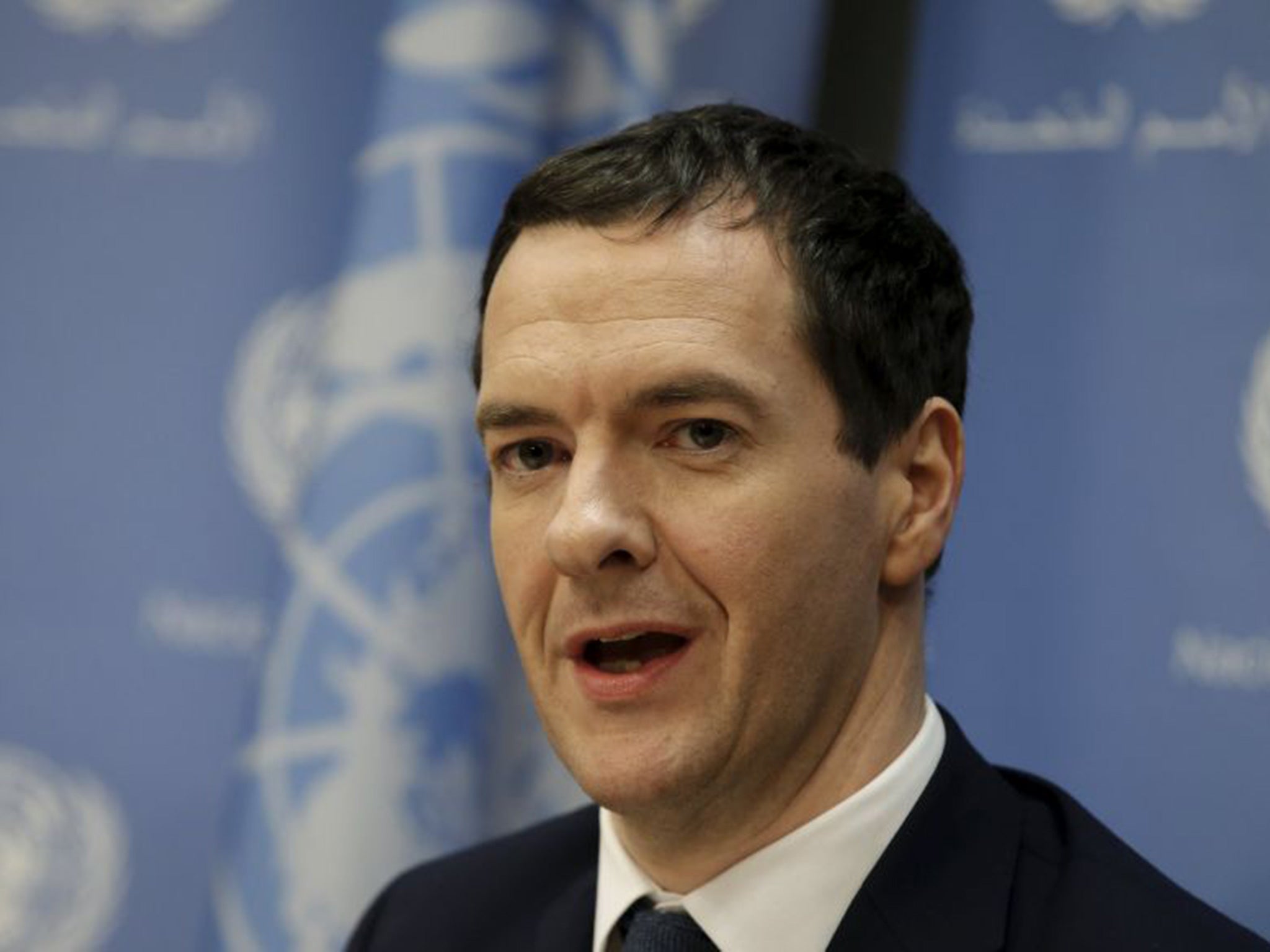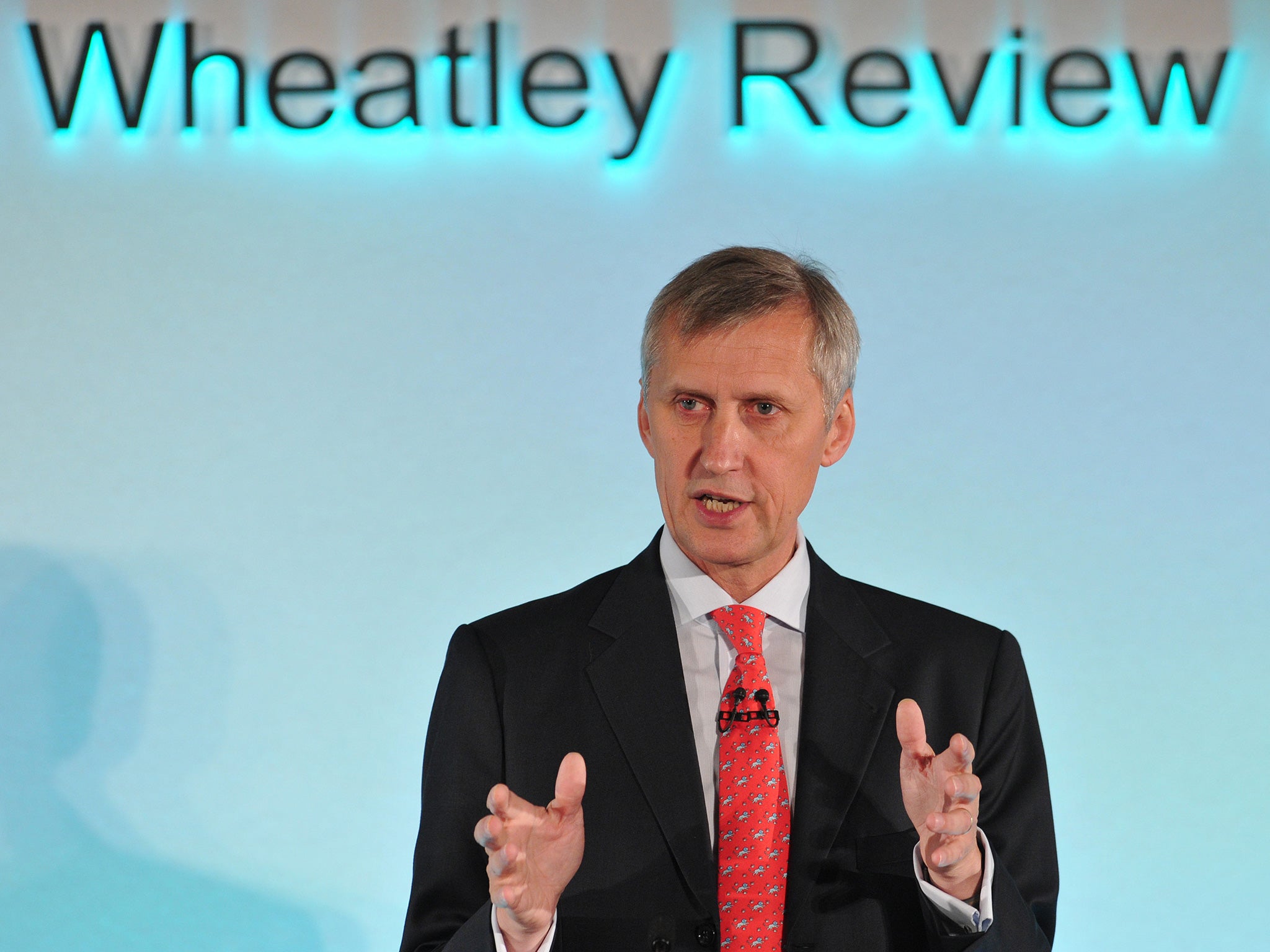George Osborne met with senior bankers five times since election, Treasury confirms
Revelation will stoke alarm about the resurgent influence of the financial lobby over government regulation

Your support helps us to tell the story
From reproductive rights to climate change to Big Tech, The Independent is on the ground when the story is developing. Whether it's investigating the financials of Elon Musk's pro-Trump PAC or producing our latest documentary, 'The A Word', which shines a light on the American women fighting for reproductive rights, we know how important it is to parse out the facts from the messaging.
At such a critical moment in US history, we need reporters on the ground. Your donation allows us to keep sending journalists to speak to both sides of the story.
The Independent is trusted by Americans across the entire political spectrum. And unlike many other quality news outlets, we choose not to lock Americans out of our reporting and analysis with paywalls. We believe quality journalism should be available to everyone, paid for by those who can afford it.
Your support makes all the difference.George Osborne has privately met representatives of major banks five times since the general election, in a revelation that will stoke alarm about the resurgent influence of the financial lobby over government regulation.
In his Mansion House speech in June, Mr Osborne promised a “new settlement” with the banks, widely interpreted by the City of London as a gesture of peace from the Chancellor after years of supposed “banker bashing”.
Since then, a number of major Government decisions have been interpreted as sympathetic to the interests of the big banks. Mr Osborne sacked the head of the Financial Services Authority, Martin Wheatley, who was reviled by the banks for his tough stance.
The Chancellor has also reformed the annual bank levy to make it less onerous for large banks with global operations and has watered down a tough new legal responsibility regime for senior bankers.
A record of Mr Osborne’s personal meetings, quietly slipped out on 17 December by the Treasury, showed that the Chancellor stepped up his personal meetings with the banking sector in the wake of his June speech.
In July – the same month Mr Osborne sacked Mr Wheatley and reformed the bank levy in the Budget he held meetings with representatives of HSBC, Standard Chartered and Santander. HSBC and Standard Chartered were the two most vociferous opponents of the bank levy.

In the same month, the Chancellor also sat down with Jamie Dimon, the boss of the giant Wall Street firm JP Morgan, which was fined $13bn by US regulators in 2013 for its activities in the run-up to the financial crisis. In September, Mr Osborne held a private meeting with Barclays. The Treasury listed the purpose of all these meetings as being “to discuss financial services”.
In the same three-month period of 2014, the Treasury’s list of ministerial meetings does not record any meetings between the Chancellor and bankers – an indication of how Mr Osborne’s door has swung open to financiers of late.
Robert Jenkins, a former member of the Bank of England’s Financial Policy Committee, said there were worrying signs of a return to the pre-financial crisis days of unhealthy banking influence.
“Regulators and their political masters were ‘captured’ by banking leaders in the run-up to the [2008] meltdown. Capture starts with banker access unbalanced by equal attention to banking’s detractors,” he told The Independent. The Treasury records no meeting between the Chancellor and any organisations pushing for deep financial sector reform.
Chistophe Nijdam, of Finance Watch, said: “Uncontested lobbying from a single group of powerful stakeholders is not good for democracy, because these stakeholders can capture the agenda in ways that may hurt the public interest. Civil society representatives are at quite a disadvantage when it comes to lobbying [because] the resources and reach of the financial industry are many times larger.”
Some regulators have also expressed their concerns about the burgeoning influence of the bank lobby. In September, Paul Fisher, deputy head of the Bank of England’s Prudential Regulation Authority, warned about the “siren voices” of finance seeking to dilute post-crisis regulation.
“We need to guard against the reforms being rolled back as a result of a period without crisis,” he said. “Let’s be cautious about the siren voices of financial self-interest that were partly responsible for luring us on the rocks in the first place.”
In the wake of the watering down of the “senior managers regime” in October, Andrew Tyrie, chairman of the Treasury Select Committee, said he was worried that “special pleading” from the banks could be influencing the decisions made by officials.
The regime was originally supposed to require bank executives to prove they were unaware of any wrongdoing at their institutions, or else face prosecution. Instead, it will only impose a less strict “duty of responsibility”.
Disclosures from the Treasury this week also show that the Chancellor’s advisers have accepted hospitality from the banking sector. Sue Beeby, Mr Osborne’s press secretary, had lunch with Lloyds in August while Richard Davies, the new head of the Chancellor’s council of economic advisors, had dinner with the British Bankers’ Association (BBA) in September.
Earlier this month, Mr Osborne appointed Angela Knight, a former head of the BBA, as chair of his Office of Tax Simplification.
The heads of the big banks are currently lobbying hard against the “ring fence” which they are required to erect around their retail arms by 2019, designed to prevent the need for another costly public bailout of the sector.
A Treasury spokesperson said: “As anyone would expect, the Chancellor and other Ministers meet regularly with firms representing the full range of Britain’s economy. Details of these external meetings are published regularly and in line with those from other departments. Our latest publication shows that the Chancellor met with firms from all sectors of the economy, including defence, pharmaceutical, manufacturing, house building, and energy. Any suggestion of undue influence is ridiculous. The government has been consistently clear that we need a new settlement with the financial services industry, which is why we have taken concerted action to improve conduct across the banking sector and deal with the abuses and unacceptable behaviour of the past. We’ve also introduced the toughest rules on bankers’ pay of any major financial centre, hardwiring responsibility and accountability into the financial system.”
George Osborne’s private meetings with bankers
July: JP Morgan (Jamie Dimon), HSBC, Standard Chartered, Santander
September: Barclays
And his special advisors…
August: Lloyds
September: British Bankers’ Association
Media manoeuvres: Meetings with Murdoch
George Osborne held two private meetings with Rupert Murdoch in June this year before the Treasury informed the BBC that it was imposing a £650m cut to its budget.
Details of the meetings between the Chancellor and the global head of News Corp were revealed in new data published by HM Treasury. The disclosure was part of a massive dump of government documents published just before the seasonal parliamentary break.
No specific information was given about the content of the meetings. They were described simply as a “general discussion”.
In July this year, The Independent reported a meeting between the two men had taken place before the BBC Director-general, Lord Hall, was informed of the Government’s plan to force the corporation to accept new financial responsibilities that would affect its programme output.
James Cusick
Join our commenting forum
Join thought-provoking conversations, follow other Independent readers and see their replies
Comments